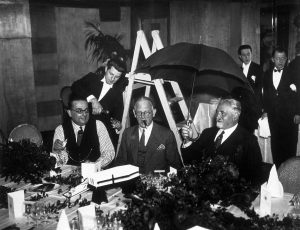Historical Origins and Haunting Occurrences: Friday The 13th
WARNING: Do not read if you have triskaidekaphobia!
While some may treat any passing Friday the 13th as any old ending to a long week, others believe that “it’s got a death’s curse!” Used throughout pop culture as a date that forebodes only misfortune, eeriness, and even irreversible consequences to walking into an abandoned sleepaway camp, the day itself holds quite an odd place in history, both ancient and modern. So, without further ado, let’s take a look at the main meaning behind Friday the 13th and see its progression as the cult classic we know and love today.

Before we look at the date itself, think about all of the negative associations the number 13 has on its own. Just like opening an umbrella indoors, breaking a mirror, or walking under a ladder, most if not all of society sees this fated number as a symbol of bad luck. However, where did that come from? Well, according to History.com, “western cultures have historically associated the number 12 with completeness.” Think about the zodiac, Hercules’s trials, Christmas, and more. On the flipside, “its successor 13 has a long history as a sign of bad luck.” Going back to one historic document in particular, the Code of Hammurabi, a specific aspect of it seems to stand out. Historians suggest that the document “omitted a 13th law from its list of legal rules. In reality, the omission was no more than a clerical error made by one of the document’s earliest translators who failed to include a line of text—in fact, the code doesn’t numerically list its laws at all.” Even so, this haunting numeral appears in other places throughout history, whether it be at the Last Supper or on Valhalla.
Since then, the motif of this fated date being one of disaster seemed to stick. Throughout the later part of the 19th-century, the Thirteen Club dominated the myths and legends of upper class America. “The group dined regularly on the 13th day of the month in room 13 of the Knickerbocker Cottage, a popular watering hole Fowler owned from 1863 to 1883. Before sitting down for a 13-course dinner, members would pass beneath a ladder and a banner reading ‘Morituri te Salutamus,’ Latin for ‘Those of us who are about to die salute you,'” notes History.com. Sounds a little spooky, huh? Believe it or not, even some U.S. presidents were involved.

Now, we arrive upon the greater present. One may think we’ve moved passed the fear of a literal number, but enough traumatic events have occurred to place seeds of doubt within the minds of the public. For example, phenomena such as “the disappearance of a Chilean Air Force plane in the Andes (October 1972); the death of rapper Tupac Shakur (September 1996) and the crash of the Costa Concordia cruise ship off the coast of Italy, which killed 30 people (January 2012),” have all landed on this frightening day. While some may just see these as unfortunate coincidences, others are stanchly determined that supernatural forces are to blame.
Besides the movie and some works of fiction here and there, Friday the 13th (which I definitely recommend giving a watch if you love horror) holds an incredibly special place in history, lore, religion, and traditions. So, I ask you from the bottom of my heart to stay safe on this coming 13th, my friends. Besides this, always remember to strive for the impossible, be extraordinary, and start bringing a jacket to school, Knights!
Sources:
History.com Editors. “Friday the 13th.” History.com, A&E Television Networks, 10 Oct. 2017, www.history.com/topics/folklore/friday-the-13th.







